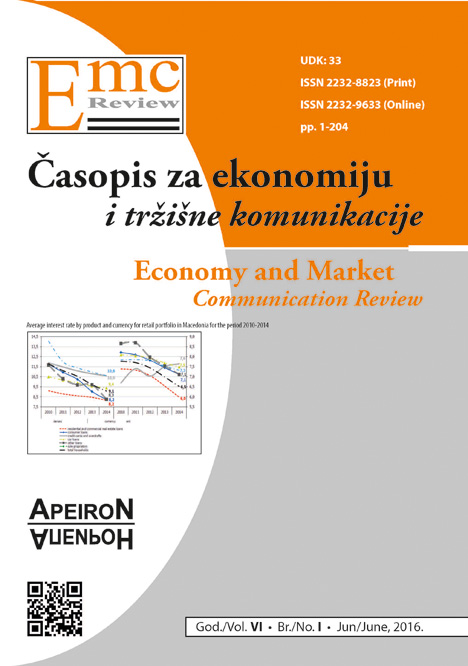EFIKASNOST FINANSIJSKIH TRŽIŠTA / EFFICIENCY OF FINANCIAL MARKETS
DOI:
https://doi.org/10.7251/EMC16066KAbstract
Are financial markets efficient is a question on which there is still no clear and complete answer. Position that prices of securities fully reflect available information about securities is called the efficient market hypothesis (EMH). The EMH (on the example of stocks) has three forms (or levels) of efficiency: 1) the ‘’ weak’’ form of the EMH- is the claim that stock prices reflect all information contained in previous transactions; 2) the ‘’ semi- strong’’ form of the EMH- is the claim that stock prices reflect all publicly available information, and 3) the’’ strong’’ form of the EMH- is the claim that stock prices reflect all relevant information (public and private), including the privileged (the insider) information.
Numerous studies have confirmed the existence of a’’ weak’’ form of the EMH, and generally supported the existence of a’’ semi-strong’’ form of the EMH, but not of a ‘’ strong’’ form of the EMH. However, the EMH, even if it is a ‘’weak’’ or a ‘’semi-strong’’ form has a number of weaknesses. Some of the the EMH assumptions confront with the reality – there is no perfect information, transaction and information costs can be significant, markets are often imperfect, and investors do not have complete knowledge about the set of all available financial strategies for a given situation.
The information ’’overload’’ confuses people and affects their ability to prioritize and make good decisions. On the other hand, electronic trading method significantly affects the information at the disposal of the different market actors. It seems that the greatest threat to the EMH comes from the field of behavioral finance, which is engaged in research on the possible impact of psychological factors (loss aversion, anchoring, overconfidence...) on the behavior of investors. The basic argument of behavioral finance is that ’’standard’’ financial theory is not paying attention to how ordinary people make decisions and that ‘’ human factor’’ can not be ignored.
Tha aim of this study was to critically examine the EMH. Apperently, the EMH after numerous studes and identified anomalies, largely remains at the level of (insufficiently confirmed) hypothesis, although it is often given the status, or created an illusion, of confirmed. This is also because the EMH is an important component of the rulling ’’paradigm’’ in finance or ’’standard finance theory’’. Joperdizing the status of the EMH bring into question many other important components of this ’’paradigm’’.
The EMH has not offered acceptable answers to some of the specific developments and events in the financial market, including the last global financial crisis. But, the EMH still remains one of the cornerstones of ’’standard’’ finance theory.
